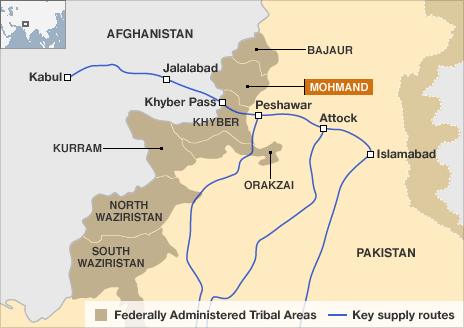Pakistan outrage after 'Nato attack kills soldiers'
- Published

Pakistani officials have responded with fury to an apparent attack by Nato helicopters on a border checkpoint they say killed at least 24 soldiers.
The "unprovoked and indiscriminate" attack took place in Mohmand tribal region, the Pakistani military said.
Prime Minister Yousuf Raza Gilani called it "outrageous" and convened an emergency meeting of the cabinet.
Nato's force in Afghanistan is investigating and has offered condolences to the affected families.
The night-time attack took place at the Salala checkpoint, about 1.5 miles (2.5 km) from the Afghan border, at around 02:00 local time (21:00 GMT).
A statement from the Pakistani army said 24 people were killed and 13 were injured.
Prime Minister Gilani cut short a visit to his hometown to return to Islamabad, where he called an emergency meeting of the cabinet.
A foreign ministry statement said he was taking up the matter with Nato and the US "in the strongest terms".
Within hours of the alleged attack it was reported Pakistan had closed the border crossing for supplies bound for Nato forces in Afghanistan - a move which has been used in the past as a protest.
The BBC's Syed Shoaib Hasan in Karachi says furious Pakistani officials insist there was no militant activity in the area at the time.
The incident looks set to deal a fresh blow to US-Pakistan relations, which had only just begun to recover following a unilateral US raid that killed Osama Bin Laden in Pakistan in May.
'Unacceptable aggression'
A senior Pakistani military officer told Reuters news agency that efforts were under way to transport the bodies of the dead soldiers to Mohmand's main town of Ghalanai.
"The latest attack by Nato forces on our post will have serious repercussions as they without any reasons attacked on our post and killed soldiers asleep," he said, requesting anonymity because he was not authorised to talk to the media.
The Pakistani army said in a statement that two border posts had been attacked by helicopters and fighter aircraft. It said Pakistani troops fired back as best they could.
It said the Chief of Army Staff General Ashfaq Parvez Kayani had strongly condemned the "blatant and unacceptable act", and demanded "strong and urgent action be taken against those responsible for this aggression".
In a statement, Isaf commander Gen John R Allen said the incident "has my highest personal attention and my commitment to thoroughly investigate it to determine the facts".
"My most sincere and personal heartfelt condolences go out to the families and loved ones of any members of Pakistan Security Forces who may have been killed or injured."
In apparent response to the attack, lorries and fuel tankers were being stopped at Jamrud town in the Khyber tribal region near the city of Peshawar, officials and local media said - part of a key route supplying Nato equipment to Afghanistan.
"We have halted the supplies and some 40 tankers and trucks have been returned from the check post in Jamrud," Mutahir Zeb, a senior government official, told Reuters.
Pakistani troops are involved in fighting the Taliban in the crucial border region area. Hundreds of militants have been resisting attempts by the security forces to clear them from southern and south-eastern parts of the district.
Anti-militant operation
The checkpoint at the centre of this latest incident was set up to prevent insurgents crossing over the border into Afghanistan, our correspondent says.
He says the movement of insurgents from the area into Afghanistan has been a concern for the Nato-led Isaf and the US.
The US has been targeting militants in Pakistan's tribal areas near the Afghan border for several months, often using unmanned drone aircraft.
Last year, US helicopters accidentally killed two Pakistani soldiers near the border, also prompting Pakistan to temporarily close the border to Nato supplies.
In October, Pakistan's army chief Ashfaq Kayani warned the US against taking unilateral action in nearby North Waziristan.
He said that the US should focus on stabilising Afghanistan instead of pushing Pakistan to attack militant groups in the crucial border region.
Washington has for many years urged Islamabad to deal with militants in the area.
- Published12 May 2011